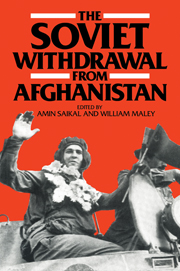Book contents
- Frontmatter
- Contents
- Preface
- 1 Introduction
- 2 The Geneva Accords of April 1988
- 3 Post-Withdrawal Afghanistan: Light at the End of the Tunnel
- 4 The Regional Politics of the Afghan Crisis
- 5 The Afghan Conflict and Soviet Domestic Politics
- 6 The Soviet Armed Forces and the Afghan War
- 7 Afghanistan and Soviet Alliances
- 8 Afghanistan and Sino-Soviet Relations
- 9 The Afghanistan 'Settlement' and the Future of World Politics
- 10 Conclusions: Management of the Afghan Crisis
- List of Contributors
- Index
9 - The Afghanistan 'Settlement' and the Future of World Politics
Published online by Cambridge University Press: 09 November 2009
- Frontmatter
- Contents
- Preface
- 1 Introduction
- 2 The Geneva Accords of April 1988
- 3 Post-Withdrawal Afghanistan: Light at the End of the Tunnel
- 4 The Regional Politics of the Afghan Crisis
- 5 The Afghan Conflict and Soviet Domestic Politics
- 6 The Soviet Armed Forces and the Afghan War
- 7 Afghanistan and Soviet Alliances
- 8 Afghanistan and Sino-Soviet Relations
- 9 The Afghanistan 'Settlement' and the Future of World Politics
- 10 Conclusions: Management of the Afghan Crisis
- List of Contributors
- Index
Summary
It is important to realise that Soviet withdrawal should not be confused with the attainment of real peace and justice in Afghanistan, that the war there is far from over, and that the responsibilities of those governments and private initiatives that have helped the Afghan people are now in a new phase, and have certainly not ended. In my view, we need to remind ourselves of this reality. Otherwise, it is likely that our attention will lapse, and that our political leaders and media will unwittingly facilitate our forgetting Afghanistan.
In many respects, I feel that few situations since the Second World War have so challenged the moral and political resources of the West as has the Soviet invasion of Afghanistan. Especially for those who, like myself, have been critical over the years of US interventionary diplomacy in the Third World it sometimes seemed difficult to encourage support for the Afghan resistance in the face of the perception that much of the official level of outrage about the Soviet invasion in our countries seemed opportunistic, a way of reviving Cold War tensions to justify increases in arms spending and the like. Despite such complicating circumstances the Afghan ordeal has been above all a challenge to those of us who believe in the rights of the peoples of the world to control their political, economic, and cultural destiny free from outside military and paramilitary interference.
In this chapter, I propose to consider the international implications of the Soviet withdrawal. This emphasis relieves me of the obligation to consider either the unfolding of the struggle within Afghanistan or the regional effects of Soviet withdrawal.
- Type
- Chapter
- Information
- The Soviet Withdrawal from Afghanistan , pp. 142 - 160Publisher: Cambridge University PressPrint publication year: 1989



